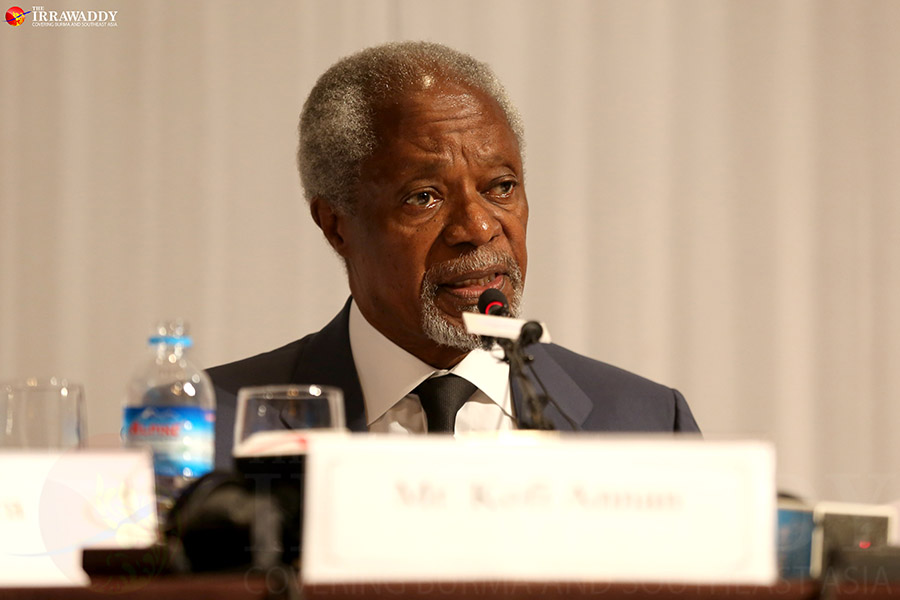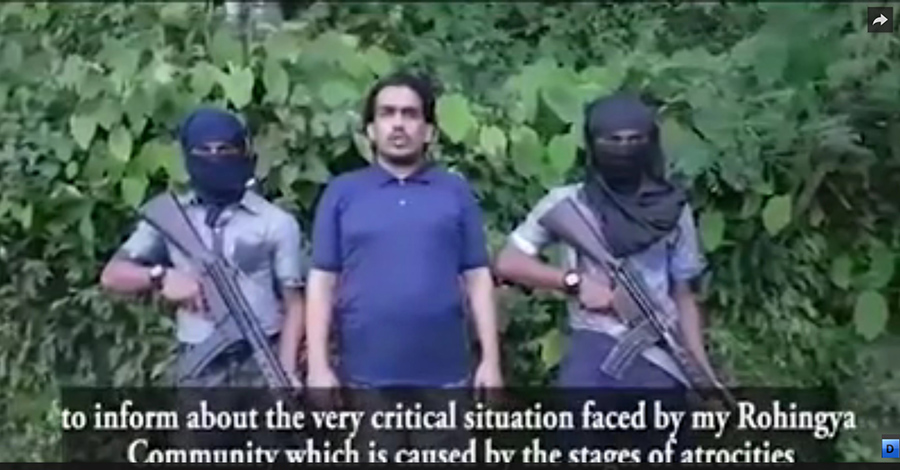It was “Myanmar’s Black Friday” declared National Security Advisor U Thaung Tun at a press briefing, describing the August 25 attacks on 30 police stations and an army base in Northern Rakhine State.
Now, the question is how to prevent Myanmar’s second “Black Friday.”
The volatile situation in Rakhine State will require time, patience, and calm responses to counter extremists and assure citizens.
First, the government needs to restore normalcy, and deliver aid and assistance to the needy. A military presence is required to maintain security, but in the long run, a political solution must be sought.
Whatever obstacles and strains they may have, the government and military should coordinate (they have been doing so according to their press briefings) to establish a clear strategy on Rakhine State.
The importance of a report issued by the Kofi Annan-led Rakhine Advisory Commission has been acknowledged in part. Upon receiving the commission’s report, State Counselor Daw Aung San Suu Kyi hastily said that her government would implement the recommendations, but army leaders voiced their reservations.
If that is the case, the two will have to find common ground and reconcile pragmatically in order to move forward. We can’t have a repeat of the violent attacks or allow Muslim extremists to gain control. Army leaders must have a reason behind their hesitance to implement the commission’s recommendations. And make no mistake, we all know who calls the shots in Myanmar. The army is the country’s most powerful institution and it is deeply entrenched in politics. It is important to listen to these army leaders as well as the elected civilian leaders.

Combat Terrorism? But How?
First, the government and military should not fall into terrorists’ trap. The Brussels-based International Crisis Group warned that terrorists wanted a strong military reaction and corresponding political backlash to the attacks.
We saw that the army, which deployed additional troops to Northern Rakhine ahead of the attacks, was not able to secure the large territory. Perhaps the army planned to divide its troops to tackle insurgents belonging to the Arakan Army that are active along the China border and recently in Paletwa Township, Chin State, next to Arakan State.
So when the attacks occurred and soldiers scattered, they were unable to maintain a hold, as they were instructed to exercise restraint and were outnumbered by mobs that included women and children.
Army leaders were well aware of the international comdemnation that could arise, as an increase in troop operations has often been tied to accusations of human rights abuses and excessive force.
After attacks on Oct. 9, 2016, the army was accused of serious rights abuses against the Rohingya. Since then, there have been repeated requests for the Myanmar government to allow access to a United Nations fact-finding mission to the area, which has thus far been denied.
At the press briefing, National Security Advisor Thaung Tun said that the government would exercise “maximum restraint” in order to avoid collateral damage and casualties among innocent civilians.

At the same time, opposition parties including Arakanese politicians and former ruling party leaders have pressed to declare an emergency situation in Rakhine State. This will only heighten tensions and is not a permanent solution. Whether armed forces leaders including Snr-Gen Min Aung Hlaing want to take on this burden is the question.
Domestic and international media are covering the issue, and the attention of the UN and the international community is there. And in fact, this is a good opportunity to explore the real cause of the attacks and explain the situation on the ground, as it was recently raised at the UN Security Council. Embassies and organizations are ready to assist Myanmar to combat terrorism if necessary.
The government and army need to respond to some media’s one-sided coverage of the issue without emotion, and as well counter some allegations and pressure. But they need to be extremely careful when rushing to accuse INGOs and NGOs of aiding terrorists. This could backfire against the government and undo much-praised reforms. To eventually repair the wounds in Rakhine State, Myanmar will need international goodwill and assistance.
Thus, it should allow media access to troubled northern Rakhine State with protection provided for reporters, and begin to allow aid and outside support in the near future. International media at the moment is too far removed from the situation on the ground to provide nuanced coverage.
To hunt down those that the government has deemed terrorists, Myanmar will also need sophisticated training, regional and international support and coordination. Over the years, authorities have studied the immediate and root causes and effects of the conflict, but much more remains to be done.
Sending infantry troops to engage extremists who allegedly have international ties will not work in the long run. Myanmar will need counterterrorism training and to strengthen the National Security Agency and intelligence gathering forces
A Rakhine task force and counterterrorism strategy are needed – starting with a debate in Parliament. But the government, military, law enforcement, and intelligence agencies will all need to coordinate to combat and prevent terrorism. This includes the business and finance sector, in regards to rooting out terrorist financing. In this context, maintaining law and order and respecting human rights are both key compenents.
Thus, Myanmar will need to seek assistance and draw lessons from its neighbors particularly India, China, Indonesia and Thailand.
Indonesia, for instance, has come a long way. In order to conduct counterterrorism campaigns, police there have been given priority jobs and trainings. The military has also played its part in gathering intelligence, and providing civic assistance in conflict areas and propaganda campaigns. Myanmar has a lot to learn from its neighbors in countering any future threats of terrorism.
More importantly, Myanmar will have to work with moderate voices in Rakhine State and beyond. There is some encouraging news in that local Muslim and Buddhist leaders have stated that they don’t agree with or condone the use of violence in the region. Violence is not the solution to the issues to Rakhine State.
The danger that Myanmar faces is real and will have serious long-term consequences within the country and beyond its borders.
The government and security agencies must be aware that there are extremist elements such as IS and the Taliban that could exploit the plight of Muslims in Rakhine State.
Some regional security analysts predict that it’s only matter of time before jihadists flock in. The real danger is in homegrown terrorists linking with foreign backing, which will only inflame the violence in Northern Rakhine.
At a press briefing, Home Affairs Minister Lt-Gen Kyaw Swe said that the latest attacks show that the Arakan Rohingya Salvation Army (ARSA) is trying to establish an “Islamic State” in Maungdaw and Buthidaung townships. But this is not new. Myanmar saw the rise of local mujahideen starting in the late 1940s when the country regained its independence. Muslim leaders sought the concession of land to East Pakistan (now Bangladesh), but this was rejected by Myanmar and the insurrection was quelled by the army. During World War II, colonial forces, both British and Japanese, exploited the Arakanaese and Muslim populations along this loose border.

Convene an NDSC Meeting?
Brig-Gen Win Tun claimed at the press briefing that the recent systematic attacks were a plan to force locals to flee the area. Military leaders claimed that militants had taken four steps toward claiming territory: scaring locals from the area, killing government informants, the October 9 attacks last year, and the latest attacks.
Army leaders have wanted to call a meeting of the 11-member National Defense and Security Council (NDSC) as mandated in the military-drafted 2008 Constitution, but the ultimate decision rests in the hands of President Htin Kyaw, a close confidante of Daw Aung San Suu Kyi. Such a meeting would be used to present and analyze the country’s security situation and discuss preparations.
The meeting could also serves to warm relations between the two sides, as interactions between Daw Aung San Suu Kyi and the commander-in-chief have been uneasy at times.
If the meeting is held, State Counselor Daw Aung San Suu Kyi will sit as foreign minister along with the president, vice presidents, commander-in-chief, vice commander-in-chief, and border and home affairs ministers. The president, and not Daw Aung San Suu Kyi, will chair the meeting and one thing is certain – he will need to make some major assessments and decisions.
The government and the army had a duty to secure the northern territory and prevent further attacks. But this is also a sovereignty issue for Myanmar and its citizens. The country should pay attention to international concerns but it must listen to its own inner voice, because it is this country and its citizens that will need to find a solution.

















